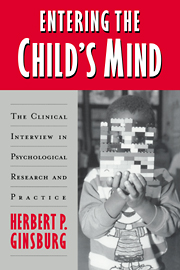Book contents
- Frontmatter
- Contents
- Preface
- Acknowledgments
- 1 The Need to Move Beyond Standardized Methods
- 2 What Is the Clinical Interview? Where Did It Come From? Why Do It?
- 3 What Happens in the Clinical Interview?
- 4 Not a Cookbook: Guidelines for Conducting a Clinical Interview
- 5 Evaluating Clinical Interviews: How Good Are They?
- 6 Toward the Future: The Clinical Interview and the Curriculum
- Appendix: Transcript of the Interview with Toby
- Notes
- References
- Index
5 - Evaluating Clinical Interviews: How Good Are They?
Published online by Cambridge University Press: 16 September 2009
- Frontmatter
- Contents
- Preface
- Acknowledgments
- 1 The Need to Move Beyond Standardized Methods
- 2 What Is the Clinical Interview? Where Did It Come From? Why Do It?
- 3 What Happens in the Clinical Interview?
- 4 Not a Cookbook: Guidelines for Conducting a Clinical Interview
- 5 Evaluating Clinical Interviews: How Good Are They?
- 6 Toward the Future: The Clinical Interview and the Curriculum
- Appendix: Transcript of the Interview with Toby
- Notes
- References
- Index
Summary
American authors, who love to do things big, often publish experiments made on hundreds or even thousands of persons; they believe that the conclusive value of a study is proportional to the number of observations. That is only an illusion.
Binet, in Cairns, “Phenomena Lost”Questions about the objectivity, reliability, validity, and replicability of findings — the standard issues of scientific research — will continue to be asked, but answers will take a form consistent with the new perspective rather than with the outworn mainstream model.
Mishler, Research InterviewingThis chapter is necessarily heavier and more technical than the rest, because evaluating the clinical interview requires some specialized “psychometric” concepts and arguments. I try to present the technical material in as clear and simple a way as possible, so that beginners can understand it. More advanced students can, I think, profit from the somewhat novel view of reliability and validity presented here. Of course, those already convinced of the method's value may wish to skip the chapter entirely and proceed to the next.
THE NEED FOR EVALUATION
I have tried to make as strong a case for the clinical interview as possible, arguing that it can be a valuable method for both research and practice.
- Type
- Chapter
- Information
- Entering the Child's MindThe Clinical Interview In Psychological Research and Practice, pp. 159 - 208Publisher: Cambridge University PressPrint publication year: 1997



